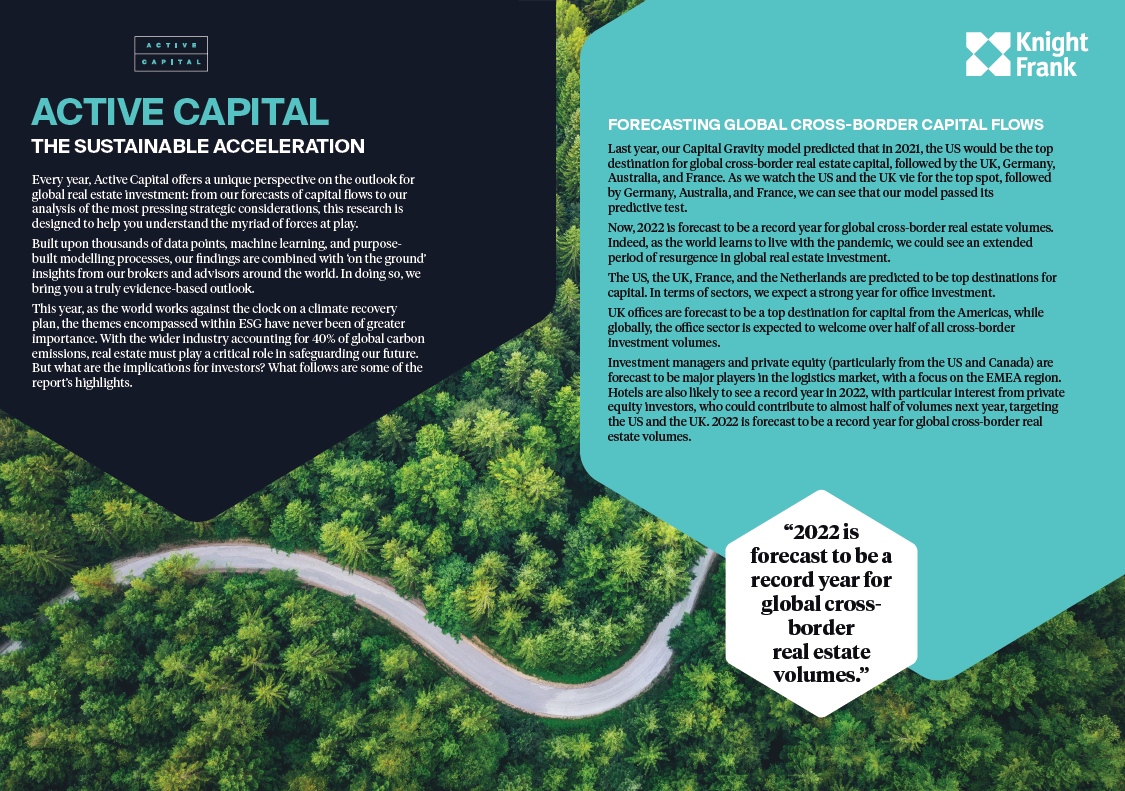Executive summary: the sustainable acceleration
Active Capital is our flagship Global Capital Markets report. It offers a unique perspective on the outlook for global real estate investment. Here is the executive summary of this year's report.
2 minutes to read
Forecasting global cross-border capital flows
2022 is forecast to be a record year for global cross-border real estate volumes. The US, the UK, France, and the Netherlands are predicted to be top destinations for capital.
In terms of sectors, we expect a strong year for office investment – globally, the office sector is expected to welcome over half of all cross-border investment volumes. Hotels are also likely to see a heightened demand in 2022, with particular interest from private equity investors.
The search for sustainably led cities
Based on our unique index of the considerations most applicable to real estate investors, London, Paris, New York, Seoul, and Tokyo sit as the top five global sustainably led cities.
These cities benefit from a range of factors, such as declining carbon emissions per person; well-developed public transport networks; and a relatively high number of green-rated buildings. However, no city is immune to climate risks.
Investors, almost universally, need to be accounting for the prospect of increased weather events and climate change, and the resulting impact on their portfolios.
Quantifying green building value
We found that prime Central London office buildings with a BREEAM Excellent rating enjoy a 10.5% premium on sales price compared to equivalent unrated buildings, while those with a BREEAM Very Good rating enjoy a 10.1% premium.
In addition, prime office buildings in Melbourne and Sydney with a NABERS rating of 5+ enjoy a 17.9% premium on sales price compared to equivalent unrated buildings, while those with a lower NABERS rating enjoy an 8.3% premium.
The global rise of sustainable finance
Sustainable financing continues its meteoric rise, supported by central bank and government incentives around the world. EMEA remains the global centre, supported by ECB and Bank of England incentivisation.
Asia-Pacific is quickly catching up, with, for example, the Chinese Central Bank offering incentives to the wider banking system to provide discounted loans to corporates making headway with emission reduction initiatives.
Meanwhile, Canada has seen evidence of sustainable real estate loans, and in the US, Fannie Mae has started green financing against multifamily residential.
ESG’s impact on corporate performance
By analysing the operating profit margins of over 600 global listed real estate firms, we have found that governance has the most significant contribution to firm performance out of multiple ESG benchmarks.
The number of non-executive directors; experience through board tenure; gender diversity at board level; moderated executive compensation relative to total firm assets; and high board meeting attendance all contributed to higher operating profit margins.
Lower energy use and environmental partnering also positively impact performance.

Download the executive summary of Active Capital.